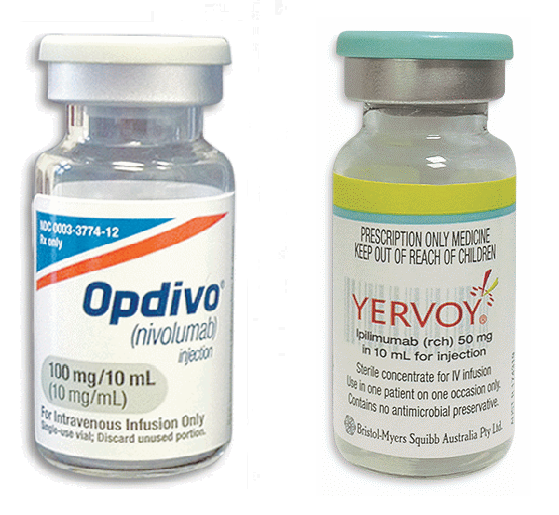Bristol-Myers Squibb (NYSE: BMY) announced Tuesday mixed results from its Opdivo-Yervoy clinical trial to treat kidney cancer patients by meeting only one of three primary endpoints, sending stocks down 2.4 percent later in the day.
The phase 3 clinical trial (CheckMate-214) tested an Opdivo (ingredient: nivolumab) and Yervoy (ingredient: ipilimumab) combination in comparison to Pfizer’s Sutent (ingredient: sunitinib) in 1,070 untreated patients with advanced or metastatic renal cell carcinoma.

Renal cell carcinoma is the most common type of kidney cancer in adults, causing more than 100,000 deaths worldwide each year.
The company’s “encouraging” data showed that out of the three primary endpoints – objective response rate (ORR), progression-free survival (PFS), and overall survival (OS) – it only met the ORR enpoint.
The ORR results from the randomized, open-label study “favored” BMS’s Opdivo-Yervoy combination treatment over sunitinib alone (41.6 percent versus 26.5 percent).
The progression free survival was also higher than the sunitinib monotherapy at 11.56 months versus 8.38 months but was not “statistically significant” according to a company statement issued Tuesday.
OS results – which will be the deciding factor for Opdivo to gain FDA approval to become a first-line treatment for kidney cancer – will not be known until the trial’s completion in 2019.
“We are encouraged by the totality of the CheckMate-214 data. The overall response rate favored the Opdivo and Yervoy combination. This is an important study in first-line renal cancer as these patients need new options,” said Vicki Goodman, an official at Bristol-Myers Squibb.
Industry experts remain cautious regarding the results. Some have noted the falling stock prices are not warranted considering the trial was not “a total failure.” Pharmaceutical company shares are often sensitive to clinical trial results.
■ Related: How do clinical trials affect stock prices of pharmaceutical giants?
In the meantime, the programmed death-1 (PD-1) immune checkpoint inhibitor is used as a second-line treatment for kidney cancer patients who have not responded to the first round of therapy, which accounted for a significant portion of the company’s second -quarter sales.
“Opdivo is now well established as the standard of care for the treatment of second-line renal cell carcinoma,” Goodman added. “The company plans to share these valuable first-line data with regulatory authorities, and we look forward to reporting overall survival when these data mature.”
Opdivo remains number one in the immunotherapy market approved for several indications, and Merck’s Keytruda is a close second.

